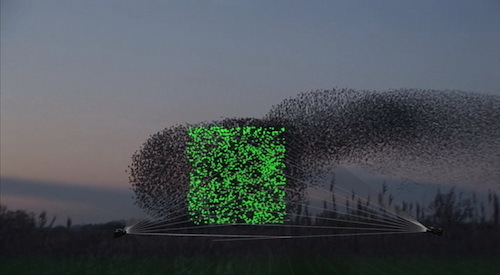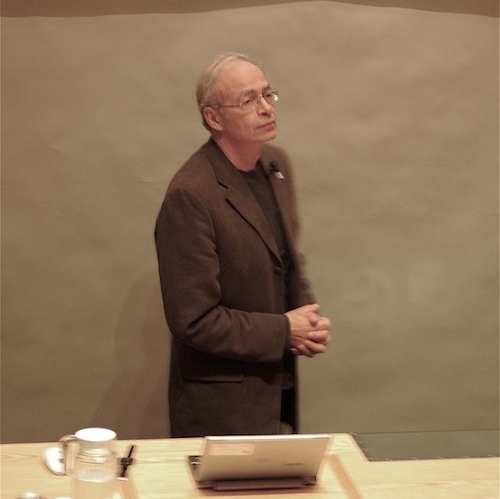Discovery Institute's Blog, page 226
August 23, 2014
Robots to Kill Humans to "End Suffering?"
Our "neurotic fear of suffering" could cause robots to kill us all out of "kindness," a tech executivehas warned. From the Daily Mail story:
Future generations could be exterminated by Terminator-style robots unless machines are taught the value of human life.
This is the stark warning made by Amsterdam-based engineer Nell Watson, who believes droids could kill humans out of both malice and kindness. Teaching machines to be kind is not enough, she says, as robots could decide that the greatest...
August 22, 2014
To Avoid the Implications of Cosmic Fine-Tuning, a Continuing Quest

Remember, the multiverse is the currently favored prophylactic against the theistic implications of cosmic fine-tuning. So if the following sounds a bit abstruse, remember what's at stake.
Under the headline "At Multiverse Impasse, a New Theory of Scale," Natalie Wolchover at Quanta Magazine reports that as the solution to a "nasty impasse" some researchers now propose to revise ideas in physics that seemingly could not be more basic. Perhaps, we learn, "the fundamental description of the uni...
Coming to Grips with the Truth About Social Darwinism
We live today in what many call the Information Age. Digital technologies have brought a revolution in the rapid, global exchange of ideas through the Internet, satellite communications, "smart" phones technologies, and more. Unfortunately, this has not necessarily resulted in a better-informed public. Spin doctoring by media elites, agenda-driven pundits, and "experts" committed to protecting turf and status rather than to critical analysis have made it harder to get at the truth than ever...
Researchers Ran a Massive Yearlong Experiment to Get Bacteria to Evolve. Guess What Happened?
It's a struggle out there. You have to be fit to survive. When the pressure is on, nature favors the ones who can take the heat.
It's a theme that has been drummed into our heads since school. It's a cultural meme. Social Darwinists used it to justify atrocities -- see the new documentary The Biology of the Second Reich. Today's kinder, gentler Darwinists downplay the violence in the struggle for existence, yet the fact as they see it is inescapable: environmental circumstances select random...
August 21, 2014
Biological Information: How Do You Explain the Origin of Something That's So Tough Even to Define?

That's the implicit question raised by our friend and Baylor University electrical and computer engineering Distinguished Professor Robert Marks. Writing at Human Events, Marks describes the 2011 conference at Cornell that became the basis of a controversial collection of papers, Biological Information: New Perspectives -- see Casey Luskin's reporting on its tortuous road to publication. Writes Dr. Marks:
Most of these researchers [participating in the meeting], with Ph.D.'s from places like...
Watson, Dawkins: What Is It with Scientists Who Become Crusading Atheists and Raging Bigots?

First, there was James Watson who came out as a eugenicist and also remarked about how "some anti-Semitism is justified" (he later apologized). Now Richard Dawkinshas let outhis own inner bigot by claiming that women have an ethical dutyto abortDown babies. From the Telegraph story:
Richard Dawkins, the atheist writer, has claimed it is "immoral" to allow unborn babies with Down's syndrome to live. The Oxford professor posted a message on Twitter saying would-be parents who learn their child...
When Robots Swarm, It's Intelligent Design, Not Self-Organization. So Then What About Animals?

A video clip at Nature News shows a robot swarm marching into formation, creating a star shape. This is the latest achievement of the "Self-Organizing Systems Research Group" of Harvard's Wyss Institute for Biologically Inspired Engineering. Their "Kilobot army" can create any predetermined 3-D shape on command. They call it "Programmable Self-Assembly." So far, the swarm has three shapes in its repertoire: a star, a wrench shape, and a letter K.
Each coin-sized Kilobot can sense the presence...
August 20, 2014
Guide of the Perplexed: A Quick Reprise of The Edge of Evolution

On his blog, Sandwalk, University of Toronto biochemistry professor Laurence Moran expressed uncertainty concerning the basic argument of The Edge of Evolution: The Search for the Limits of Darwinism. So for anyone who wants a quick reprise of the book's reasoning, below is a list of annotated bullet points plus some commentary summarizing it.
If the development of some particular adaptive biochemical feature requires more than one specific mutation to an organism's genome, and if the interm...
More on Professor Death: Peter Singer and the Danger of the Humanities

I have little regard for the so-called thinking of Nicholas Kristof of the New York Times. With rare exceptions, he generally spouts simplistic bromides with little foundation in reason or fact.
That is why he has long extolled Princeton's Professor Death, Peter Singer, for his animal liberation advocacy. He did so again the other day in a flaccid column about why the humanities still matter. From the column, "Don’t Dismiss the Humanities":
Peter Singer of Princeton University has pioneered t...
Reflecting on Social Darwinism at the Hundredth Anniversary of World War I
This month is the one-hundredth anniversary of the beginning of World War I. Historians delving into the origins of the war will undoubtedly -- and correctly -- note the importance of the alliance structures, the buildup of armaments, Germany's fear of encirclement, and the ill-fated German military plan that left Germany few viable military options once it faced a two-front war.
Some historians mention the influence of social Darwinism on the European elites and decision-makers, but this is...
Discovery Institute's Blog
- Discovery Institute's profile
- 15 followers





